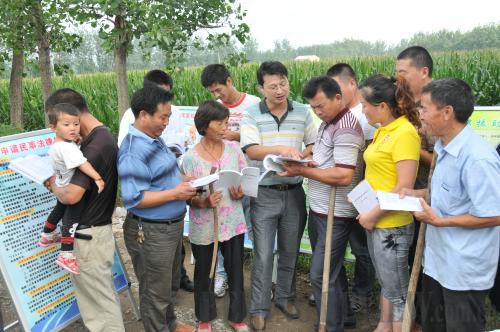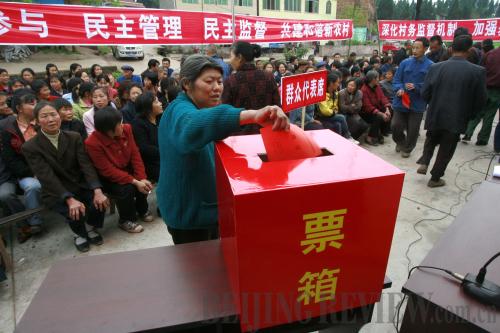|
 |
|
LEGAL AID: A lawyer (center) offers consultation services to farmers in a village in Xuzhou, Jiangsu Province, on August 30, 2011 (XINHUA) |
It seems that the bulk of foreign media reports about China's reforms have limited their focus to changes in China's economic setup with little mention paid to its political reform. Actually, since China carried out the reform and opening-up policy in 1978, it has not only made fundamental changes to its economic system but also implemented a series of important reforms to its political institutions.
The Communist Party of China (CPC) is the country's ruling party and has always advocated the development of democracy. Before the reform and opening up, the development of the country's political system was hindered by the lifelong tenure of state and Party leadership and over concentration of power at the top of the leadership chain.
After the launch of the reform and opening up in the late 1970s, the CPC leaders made great efforts to reform the state and Party leadership institutions, establishing a retirement system, fixed-term tenure system and collective leadership system for the heads of the Party and the state. Starting from the 15th CPC National Congress in 1997, each plenum of the CPC renewed the members of the Standing Committee of the Political Bureau, the Political Bureau and the Central Committee, particularly the 16th National Congress of the CPC which marked the succession from the third generation of leadership to the fourth. Both the transition of power and the replacement of officials were completed steadily and smoothly, indicating that the succession system of the leadership of the Party and the state has been established and consolidated. Although China does not exercise periodical multi-party elections, it has evolved a system of renewing administration and policies with Chinese characteristics. This is an unprecedented achievement of China's political development, reflecting the significant and profound progress of China's political system.
 |
|
VILLAGE VOTES: Residents in a village of Suining, Sichuan Province, cast ballots in a direct election for a village affairs supervisor on April 11, 2008 (XINHUA) |
The 17th National Congress of CPC held in 2007 marked the further deepening of China's reform to the Party and state leadership institutions, which featured the fact that more opinions from lower level institutions had been considered in deciding the formation of the core leadership. Before the 17th national congress, a poll about the candidates for membership of the CPC Political Bureau was carried out among 400 senior officials, which was different from the previous way of the formation of the core leadership. This reform is a milestone of the inner-Party democratic progress of the CPC.
The CPC has been trying to govern the state through law since the introduction of the reform and opening-up policy. Chinese society has been gradually transformed from one governed by officials to one governed by rules and laws, a profound change in China's political system. Meanwhile, China has made great achievements in running the state by law.
First, China has enacted laws covering every aspect of society. Up to the spring of 2011, it has introduced more than 230 laws, more than 690 administrative regulations, more than 8,600 local regulations, and more than 600 regulations applicable in ethnic autonomous regions.
Second, the existing laws and regulations have been amended and improved to safeguard human rights and political rights of citizens. For example, the Amendment to the Criminal Law of China passed in 1997 abolished the principle of "presumption of guilt." In the Amendment to the Constitution of China passed in 2004, the statement that "the state respects and safeguards human rights" was added.
|
